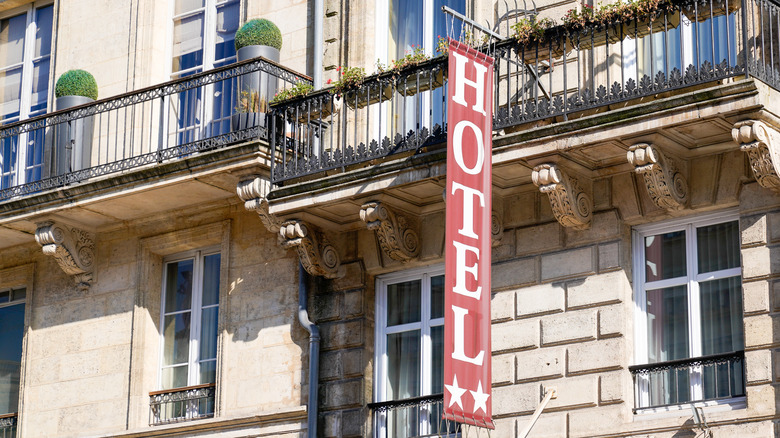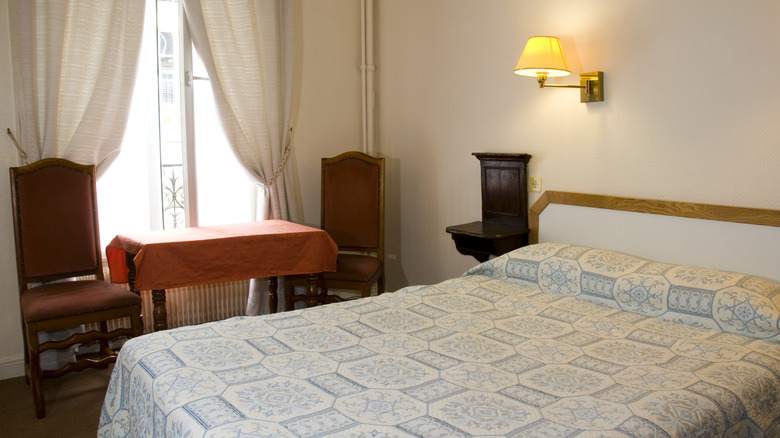Why Tourists Might Want To Opt For A Lower Star-Rated Hotel In France, Per Rick Steves
When planning a trip to France, the temptation of staying in a highly-rated hotel is strong — to match the fancy Chardonnay and escargot, of course! The stars that shine next to a hotel's name can suggest the promise of luxury, comfort, and excellent service. However, travel expert Rick Steves advises that when it comes to lodging in France, more stars don't always mean a better experience. Instead, Steves prefers the charm and authenticity of well-located, family-run two-star hotels over their fancier three-, four-, or five-star counterparts, especially if their location is less charming.
France's hotel star rating system, administered by ATOUT France, the French Agency for Tourism Development, grades hotels from one to five stars. This classification is evaluated every five years and is based on almost 300 objective criteria, such as room size, reception availability, and certain amenities, rather than more subjective measures of quality. After five years pass, the hotel can decide if they want to be re-evaluated.
However, within those five years of the certification, the hotel can drop its standards (at the risk of a 15,000 euro fine). More importantly, it should be noted that the ATOUT star rating system is optional, and many hotels do not have any classification whatsoever. Those that do present it on an official placard. While stars might indicate the presence of luxuries such as a minibar, valet parking, or room service, they don't necessarily guarantee the most crucial aspects that matter so much: charm, location, and a personal touch.
Advantages of lower star-rated hotels
Two-star hotels in France are often found in the heart of the city, close to major attractions, good cafes, and the bustling life of the town — offering an immersive experience of the French way of life. Steves points out that choosing a hotel for its location rather than its star rating can also make it much easier to explore the city on foot. This is a major draw, as renting a car, relying on public transport, or always taking organized tours can rack up.
Lower-star-rated hotels in France can be historic buildings with an architectural charm that more modern, higher-rated hotels may lack. These establishments are sometimes family-run and have been so for generations, offering a personal touch that chain hotels cannot. The staff in such hotels is often more vested in their guests' experiences, providing personalized tips and assistance that can make a stay feel more enjoyable and authentic.
Staying in a two-star hotel is undeniably more budget-friendly. This cost-saving does not necessarily come with a sacrifice in quality. Rooms in two-star hotels are typically clean, comfortable, and equipped with all the basic amenities. The money saved on accommodations can be used to enrich the travel experience, whether it's dining out, enjoying attractions, or even extending the trip. Moreover, by choosing smaller, locally run hotels, travelers can contribute more directly to the local economy rather than supporting incorporated chain hotels. Smaller hotels also often have a smaller environmental footprint than larger, more resource-intensive establishments.
Considerations and tips for your French accomodations
While the advantages are compelling, not all two-star hotels are created equal. It is essential to read reviews to gain insight into the hotel's cleanliness, the staff's friendliness, and general guest satisfaction. If certain amenities are important to you, such as Wi-Fi or air conditioning, make sure to check whether they are available. While some two-star hotels offer these conveniences, others might not. One thing tourists may be thrown off by when staying in a hotel in France is that space is minimal — this should encourage you to be out exploring.
Part of the charm of staying in a lower-star-rated hotel is the simplicity and authenticity of the experience. Embrace the unique quirks and less polished aspects that might come with such places. The floorboards might creak, and the furnishings might be old-timey — yet the nicest front-desk staff will welcome you to a location that simply can't be beaten. With that said, ensure that the hotel meets your safety and accessibility requirements, as some older hotels may not have elevators.
Rick Steves explains that splurging on a $300 or $400 a night stay for a higher-star-rated hotel will build a barrier between you and the very place you came to see, both in terms of budget and that local feel. So you can stay in a quaint two-star hotel in France for around $100 a night, bridge that gap, and save on a couple days of accommodations and experiences (you can do the math!).


